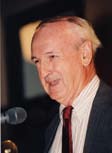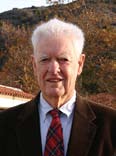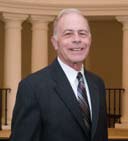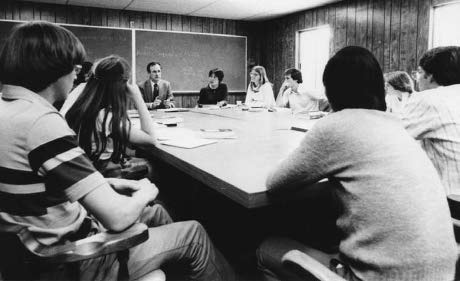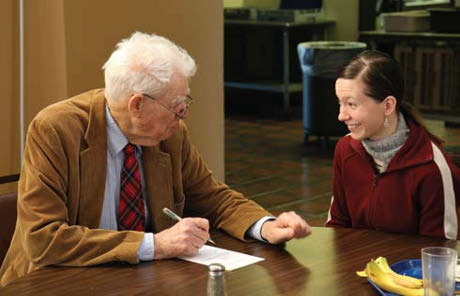- Home
-
About
 Fidelity & Excellence
Fidelity & ExcellenceThomas Aquinas College is unique among American colleges and universities, offering a faithfully Catholic education comprised entirely of the Great Books and classroom discussions.
-
A Liberating Education
 Truth Matters
Truth MattersTruth, and nothing less, sets men free; and because truth is both natural and supernatural, the College’s curriculum aims at both natural and divine wisdom.
-
A Catholic Life
 Under the Light of Faith
Under the Light of FaithThe intellectual tradition and moral teachings of the Catholic Church infuse the whole life of Thomas Aquinas College, illuminating the curriculum and the community alike.
-
Admission & Aid
 Is TAC Right for You?
Is TAC Right for You?Do you enjoy grappling with complex questions? Are you willing to engage in discussions about difficult concepts, with the truth as your ultimate goal?
-
Students & Parents
 Mind, Body & Spirit
Mind, Body & SpiritThere is always something to do at TAC — something worthwhile, something fulfilling, and something geared toward ever-greater spiritual and intellectual growth.
-
Alumni & Careers
 What Can You Do with a Liberal Education?
What Can You Do with a Liberal Education?Nothing speaks more to the versatility of the College’s academic program than the good that our alumni are doing throughout the Church and the world.
- Search
- Giving
The Founders Look Back
Note: The following interview with Thomas Aquinas College founders Dr. Ronald P. McArthur, Dr. John W. Neumayr, and Mr. Peter L. DeLuca appeared in the 40th Anniversary Issue of the College Newsletter (2011).
Question: Dr. Neumayr, how did you come to know Dr. McArthur, Mr. DeLuca, and the other founders? How did your idea of founding a college come about?
About this time Ron returned to his alma mater, St. Mary’s College, to work in the Integrated Program directed by tutors from St. John’s College, Annapolis, Md. Consequently, the great books idea entered our discussions. We said to ourselves, why not use the great masters as our means of pursuing liberal education?
I completed my graduate studies in philosophy at Laval University and began my teaching career in an honors program at Santa Clara University. Mark Berquist, who passed away last fall, was a colleague in the same program. In 1966 the two of us joined the faculty of the St. Mary’s Integrated Program with Ron.
This was the 1960s, when the Enlightenment finally stamped out what little was left of the traditions of Catholic education. The Thomistic revival initiated by Pope Leo XIII in the 19th century had been largely absorbed into neo-Thomism, in which Thomistic language may have lingered but the thought behind it was essentially modern. Thomism had hitched itself to what was passing and impermanent. Wisdom is not here today and gone tomorrow. Catholic education had sold its birthright for “a mess of pottage.” Many of us had lamented the mediocrity in the Catholic schools, but now with the collapse at hand, we came to think of making a fresh start.
It all seemed unlikely. Yet with encouragement from people whose thoughts we valued, we resolved to try. At this stage Mark Berquist and I came to know Peter DeLuca, who had been a student of Dr. McArthur. We all worked together with Ron beginning in 1969. We were, of course, novices at founding colleges, and apparent failures outnumbered seeming successes. But with the prayers of many (many of whom we shall never know), Providence allowed Thomas Aquinas College to come into existence in 1971. And, praise be to God, here we are.
Question: To what extent did you and the other founders look to St. John’s College as a model in establishing Thomas Aquinas College? And how would your new college differ?
Jack, Mark, and I were greatly helped in the founding of the College by studying at Laval University under the direction of Charles De Koninck, who showed us how to read and learn from Aristotle and St. Thomas. Our studies there enabled us to begin the intellectual life from within — something we hoped we could encourage in our prospective students. Without such direction, we were convinced that the reading of the great books led to eclecticism, which is radically opposed to the Christian wisdom which directed our efforts.
Dr. Neumayr: St. John’s College not only convinced us that the great books, the classical works of the great masters, should be used instead of textbooks, but also that tutorials and seminars were more engaging for the intellectual life than mere lectures. Beyond this, however, St. John’s had developed the quadrivial part of the liberal arts, that is, the classic course of mathematical studies, in a way substantially in keeping with the curriculum we wished to establish.
But there was a difference from St. John’s — one of great importance. It is one thing to read great authors for their thought and even to discuss their ideas in depth. It is another thing to read them with the desire primarily of knowing the things they talk about. The mind wishes to understand reality primarily and has only an interest in the great ideas insofar as they unfold what is true about the visibilia, “the visible things around us.” In this sense Thomas Aquinas College, in its fundamental thrust, is not a great books college.
Question: How would Thomas Aquinas College differ from other Catholic colleges?
Dr. McArthur: We wanted a college that was seriously intellectual. We wanted, as such, to frame a curriculum that would be possible but demanding. At the same time, we wanted it to be deeply Catholic, which is impossible without a serious curriculum to match. People can have good will and be very good people, but there is no education unless the mind is developed. It is possible to have an institution with Catholic rules, a Catholic demeanor, good Catholics as teachers and students, but yet fail to educate. This is what we wanted to address.
Question: How does one start a college?
Question: You described your early efforts, Dr. Neumayr, as making a “fresh start.” Can you explain what you meant by that, and what character this “fresh start” would have?
Dr. Neumayr: By “a fresh start” I meant that we intended to restore the core of the Catholic intellectual patrimony to its most authentic form. “The Queen,” that is, Sacred Doctrine, “called her handmaidens to the tower” (Proverbs 9:3); theology calls upon the liberal arts and sciences to help her in her work. The human mind above all desires to know the highest things and to know with all the certitude that the mind can attain to. Hence, authentic education seeks God and makes use of all the intellectual tools and the order of their use to achieve its end in the surest way. Shortcuts are of no value. Modern Catholic education largely turns to humanism, where man is the end; and the disciplines therein have only a progressive and, therefore, passing character.
Thus the role of St. Thomas Aquinas. The goal of the whole Thomas Aquinas College program is to know God as it is possible in this life. Certain divine truths, the preambles to the Faith, such as God’s existence and His attributes, are accessible to man’s reason, as St. Paul tells in his epistle to the Romans — accessible as St. Paul says by way of the visibilia, that is, the visible things around us. All we know by reason of the transcendental depends upon our knowledge of the sensible world around us.
Question: What led to the determination that there would be one curriculum for all, with no electives?
Mr. DeLuca: We have an institutional commitment to the view that all men and women share a common rational human nature, a nature that is perfected by the knowledge of truth. We therefore believe that there is a single education which enables the student to acquire the knowledge of the truth and especially of the truth that will make him free. Traditionally, in Western civilization, this is called liberal education. Because it is perfective of man as man, it is the same for all.
Prior to the introduction of the elective system at Harvard in the 19th century, undergraduate liberal education typically exhibited a single curriculum. The “core curriculum” at many modern colleges is a vestige of that single curriculum maintained by those who still believe that some subjects are good for everyone. The elective system, on the other hand, is based upon modern skeptical philosophy which denies the existence of truth and, therefore, of a single education that is best for all.
Question: Why does the thought of St. Thomas Aquinas have preeminence in the Thomas Aquinas College curriculum?
Dr. McArthur: The Church, in addition to having the means of salvation through the sacraments, is also a teaching church, and it has made pronouncements about teaching and learning, about which theologians to follow, about how to follow them, and about the spirit of learning. We took these to be authoritative in the same way that we took other aspects of our religion to be authoritative — these would be our measure. Since the Catholic Church taught us that St. Thomas Aquinas, the Angelic Doctor, is the Common Doctor of the Universal Church, we could not conceive of trying to educate without being his disciples. We wanted, then, to crown our endeavors with the study of his works.
Lest anyone would think our purpose rather exotic, it is worth considering that the Penny Catechism is the catechism for St. Thomas Aquinas just as it is for the unschooled peasant; no difference. What St. Thomas does as a theologian is to unravel the catechism, to bring it to fruition with the best use of reason. We are rational animals; we want to understand. St. Thomas provides a great service, but it is an outcome of the same faith we all share.
Dr. Neumayr: Among scholars St. Thomas is a recognized master. For the Church he is the Theologian. The Church, as the popes have told us, has embraced his mind as her own — and this because he has unfolded the knowledge of ordinary experience, a knowledge shared by all men, with an almost unique fidelity to our shared experience. St. Thomas in his turn called Aristotle “The Philosopher:” the voice of the human mind itself. Speaking of Aristotle, then, Cardinal Newman said, “He told us our thoughts before we were ever born.”
Going from what we all know implicitly about the visibilia to an explicit account is not easy — and few, no matter their brilliance, have done it with perfect fidelity. Even the great St. Augustine concedes that though he knows what “time” is, he is at a loss when asked to explain it. St. Thomas and, perhaps, Aristotle before him were unique among men in this genius.
With good reason the College organized the course of studies to proceed “ad mentem Thomae.” This is to seek out an understanding of things according to the mind of Thomas; and not in any of the Neo-Thomisms that lived briefly and died in schools. This is to say that the College truly seeks to make its students disciples of Thomas. Discipleship asks more than a mere acquaintance with this master’s thought. His thought squares with our own and becomes our own.
Question: But why this unique role for St. Thomas? Why among the rich minds of the renowned scholars should Thomas stand out? Aren’t they all geniuses of a sort?
Dr. Neumayr: Yes, but Thomas was not only a genius, he was also a saint. This can hardly be claimed for most of the Masters. But you might ask what difference does sanctity make? Is it merely an inspirational aspect that it brings? Or does it bear on the intellectual life itself?
The moral, in fact, has a central part in the intellectual life. Most of the more serious errors in judgment are more moral than intellectual. It is a moral failing rather than an intellectual one to claim that you see what you do not see, or that you do not see what you do see. The fallen nature of man makes a dogmatism favoring our own ideas almost irresistible. Those who would insist that a mere hypothesis be absolute are claiming to see what they do not see. The sanctity and the genius of St. Thomas would give him a certain immunity from claiming that he sees what he in fact does not see.
This moral rectitude in the pursuit of Wisdom ad mentem Thomae, in my humble opinion, is inextricably tied up with the mission of the College, and its future depends on this discipleship to our patron.
What does this mean for discipleship? You can’t be a disciple of just anyone, but only one you take to be both wise and honest. St. Thomas makes clear, for example, that the five proofs for God’s existence set out in his Summa Theologiae are irrefutable. By his genius he sees the truth of the demonstrations; by his sanctity he does not lie. We, his students, though we may struggle, have every expectation that we may come to see as he does that God must exist and cannot not exist.
Question: In the College’s curriculum, there are works by some with whom many would disagree — Rousseau, Marx, and Hegel, for example. Can you explain why the works of authors such as these are read in the College’s program?
Dr. McArthur: I find it difficult to answer this question. We are, on the one hand, believing Catholics, and woe to us should we become heretics or apostates. Since almost all modern philosophy would of its own impetus lead us away from our faith, there is a danger in reading the philosophers who have pounded the nails in our coffin. It is not surprising, therefore, that there have been those, serious Catholics among them, who have wished to consider them in secondary sources alone, which point out, many times without evidence, their errors.
My experience, when I read the original texts in college was exhilarating, for I began to understand for the first time the culture which surrounded me, and in that awakening I was helped to reflect seriously on the Faith I claimed to believe. I came to think that saints might make it through unscathed by the assault of modern philosophy, but that most of us, without facing it, would finally succumb and compromise our religion. Therefore, for that reason alone, I consider it imperative to read, to study, and to take seriously the modern philosophers.
There is, however, another reason for studying them. Socrates shows us in the dialogues how important it is to consider the many aspects of the questions we cannot help but ask. For the most part, we start to consider things according to the opinions of those around us. If, however, we pursue the intellectual life, we try to supplant our faith with understanding. All the philosophers, therefore, can help us to think out various questions, provide us with various starting points, show us the consequences of those starting points, and show us the seriousness of the intellectual positions they hold. Aristotle, for example, was aware of the positions of Plato and the pre-Socratics; they presented him with the various positions he had to weigh before coming to some of his own solutions. It is hard to conceive that Aristotle could have discovered as much as he did without Plato. I find it difficult to think, therefore, that we can successfully think out the great questions without considering the alternative answers which have been given them. We cannot allow our students to become mere ideologues, repeating someone else’s answers to questions which were not really theirs.
Question: As fine a program as you could plan, was there any guarantee there would be students who would come, students who would be successful?
Dr. McArthur: Since most of us founders had taught or were teaching in the integrated liberal arts curriculum at St. Mary’s, we knew that the curriculum we planned could be managed by students who were sufficiently intelligent and interested enough to attempt it. The question, then, was whether there would be any students who would come to a new college, seriously orthodox in a time of crumbling convictions, with an all-required curriculum including mathematics and the sciences, and using original texts rather than the usual textbooks.
Those who first came answered that question, and with a vengeance. They were not only agreeable to the curriculum, but arrived with a focused desire to study reality in the light of their faith. Much to my astonishment, some came having started at other colleges, and some came even having completed degrees at other colleges.
Question: Can you speak about the kind of students who did come, what they brought to the College, and whether their early influence has endured?
Dr. McArthur: I noticed right in the beginning that there was a tremendous desire that the College be Catholic. The students started immediately an evening rosary, which exists to this day. They wanted the Mass, they wanted the sacraments. We found from the beginning that they wanted not only the highest kind of learning, but to nourish their faith with the use of the spiritual classics of the Catholic tradition. Soon after classes began, we found the works of St. John of the Cross, St. Teresa of Avila, St. Francis de Sales and others like them in the chapel pews, all supplied by the students themselves.
The entertainment, too, at the first Christmas party consisted of music by Mozart, Haydn, Handel, Palestrina — all performed by students. From the very beginning, therefore, the students have contributed to maintaining not only a serious mentality in the College community, but a serious concern for the arts. The early excellence of their contribution explains, I am convinced, in significant part not only the excellence of our present choirs, but the various recitals and productions of Shakespeare, Gilbert and Sullivan, and others. They are all of the highest quality.
Question: What about tutors? Were you concerned that you had set the bar too high since they would have to teach across the curriculum, from mathematics to natural science to philosophy and theology?
Dr. McArthur: We were concerned from the beginning with the question of tutors. While we ourselves could function in parts of the program, we were in no way able to teach in all its parts. We nevertheless proceeded to found the College, convinced that God would somehow provide — and He has. There were always enough tutors (sometimes barely) to provide for a growing enterprise.
It is difficult to find tutors for this program, and this is for two reasons: a) a tutorship at the College is much more demanding than a professorship in the ordinary college or university, and b) it is a ticket to anonymity, since it is very difficult to write books and become known while at the same time becoming competent in various parts of our curriculum; for this reason, we have never had “a publish or perish” requirement.
I did think at the beginning that our goal should be that every tutor should be able to teach every part of our curriculum; but since that time I have changed my mind. It is, I think, almost impossible for anyone to become a superior teacher in all parts of the curriculum. Let those who can do so, but let us be content if all of our tutors can teach at least two-thirds of the curriculum. That itself is an achievement.
I should add that most of our students, who have never gone to other colleges or universities, cannot know that they are helped and directed by an uncommon group of competent and committed teachers. Our failures, and they are legion, are minor compared to the general abandonment of education they would find elsewhere.
Question: Mr. DeLuca, you brought practical experience and know-how to the group of founders, but you also had a strong desire to teach. How much of your career at the College has been given to teaching and how much to administration?
Mr. DeLuca: I do love to teach, and I believe that those involved in the leadership of the College should remain connected to its central and defining activity. I taught full time during two periods totaling about 10 years. In the other years, I have served as vice president for administration and finance, vice president for development and, briefly, as interim president. During the years I have served as vice president for administration and finance, I have usually taught one or two classes. In general, I try to serve the College in whatever way I am needed.
Question: You have had a great deal to do with the building out of the campus. Would you talk a little about that experience?
Mr. DeLuca: Believing that liberal education is rooted in friendship, we planned to limit the size of the College to about 350. Because we wanted to do just one thing and do it well, we eschewed graduate schools and research institutes. Moreover, in order to create a true community of learning, and to help preserve moral order, we envisioned a college of all resident students with strict segregation of the sexes in the residence halls. These things allowed us to conceive the campus as a complete, finite whole and avoid the architectural chaos that has overwhelmed colleges in the post-war expansion of higher education.
By the time we were master planning the campus, the College had been in operation for several years in a rented facility. The style of the rented campus, our experience at St. Mary’s College, the presence on our new property of a beautiful Hacienda, and the fact that the property had once belonged to Mission San Buenaventura led us to choose “California Mission” as our architectural style.
Our small size allowed our plan to relegate the automobile to peripheral parking lots. We were able to lay out the various buildings in a way that related their functions appropriately: the academic buildings are grouped about the chapel while the dormitories are on the higher ground above. The whole is small enough to permit easy travel between buildings on foot, much of it in covered arcades.
We certainly learned as we went along. Our original plan called for more and smaller dormitories with more of an “indoor-outdoor” design than we ultimately built. Finding that our site has greater extremes of temperature, we built larger buildings with internal halls, while preserving the ideal of smaller living units within separate areas of the buildings.
Question: How did the building of Our Lady of the Most Holy Trinity Chapel differ from the construction of the other campus buildings?
Mr. DeLuca: First let me say how it did not differ. We began, as we typically did, with our faculty committee considering carefully how the building would serve the ends of the College and writing a “building program” to give direction to the architects. But the program differed from those for other buildings because this would be the most important building, the center of the life of the College.
The design and construction process was more complex than anyone had anticipated. We had separate design and executive architects, a construction management consultant, a general contractor, and subcontractors from as far away as New York, Spain, and Italy. We were building a structure that was at once a 13th century, Italian church and a modern, California building, meeting the required earthquake, energy conservation and fire codes. For me it was a great learning experience and a fascinating project.
Question: Thomas Aquinas College is singular in that its bylaws, established by the founders, require that the president be selected from among the members of the teaching faculty. How is this feature important?
Dr. McArthur: Our program of studies, and the method of teaching and learning, cannot be understood unless one has taught or learned in it. Therefore, at the twinkling of an eye, someone who has never undergone our kind of education might think that certain changes along the way might be quite compatible with the original intent of the College, but which in fact would ruin the whole endeavor. We therefore thought it essential to the preservation of the College that its president be a tutor.
Question: It is evident that the study of St. Thomas is a good for individual students. But is there a practical good for the Church as well?
Dr. McArthur: St. Thomas is the Common Doctor of the universal Church. The Church cannot put aside his wisdom and doctrine without severely compromising itself. The way in which the Church has thought about itself has to a large extent been formed by the thought of St. Thomas. If it is going to be a teaching church and teach in a way that connects us with the whole of its tradition, it must use its own language and its own thought. So, if Catholicism is to again become alive, there must be those who can understand it from the inside. The study of St. Thomas is a wide avenue to that understanding. To push him aside would be a disaster affecting not only those who study but everyone who calls himself a Christian.
Question: About the graduates and the wide array of pursuits in which they are engaged — is this what you expected? Did you anticipate so many vocations?
Dr. McArthur: I have never believed that the number of vocations is extraordinary; it is what one would expect from any serious Catholic education. That number is exceptional in our time because of the general decline, and even disappearance, of anything genuinely Catholic at most Catholic institutions.
I did not have any particular idea about what the graduates would do upon leaving the College. I assumed they would do more or less what everybody else does, in some form or another. I am now, however, impressed that many of them are using their talents for the good of the Church and the souls of their fellow Catholics.
I think that it would be a sign of our failure if the preponderance of our graduates were to become successful in this secularized and ungodly society. Let them, for the good of the Church and their own souls, be that “sign of contradiction” without which our society will lose all its salt.
Question: What chance did you think the whole endeavor — starting a Catholic college — would have?
Mr. DeLuca: We correctly thought that it would be very difficult to find teachers both willing and able to give life to our curriculum. At the same time, we were certainly too optimistic about how easy it would be to raise money — particularly the large amounts needed to build a campus and endow a college. And we were too pessimistic about our ability to find students both willing and able to do our program. As is the case with most worthwhile enterprises, if we had known ahead of time how difficult it would be, we would probably never have attempted it. Thanks be to God, we did!
Question: What do you see for the future of the College?
Dr. McArthur: Because of an unwavering commitment to principle, the College is essentially the same as it has been from the beginning. However, the faculty has grown over the years with the addition of many excellent tutors, such that it is now better than we were as a beginning faculty, and it should become better as time goes on. There have also been an increasing number of good students seeking what we offer them. We are to that extent better able to educate our students, and they better able to profit from our efforts. Therefore, if the College remains true to its principles, and if future administrations govern according to those principles, the College will look much the same as it does now.
The College will never be popular, will never be widely understood, and will always find it difficult to support itself. Our best chance for continued success is to keep doing what we are doing, to do it as well as we can, and leave the rest to God. He will see to it that it does His work in the Church, and that is all that is important.
Posted: December 30, 2011


